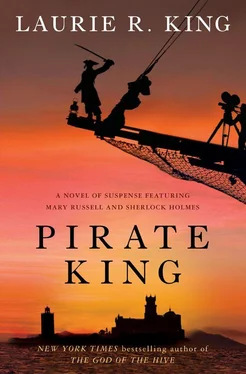And regretted having done so. I’d forgotten that the book starts out with Robinson Crusoe taken prisoner by the pirates of – yes – Salé. However, Crusoe managed to escape. Eventually. Perhaps I shall be as lucky.
In any event. This morning we docked in Lisbon, half a day late, and scurried off to a borrowed theatre with Hale’s translator, to hire us some pirates.
Our translator is a singular gent by the name of Pessoa, neat of dress and polished of shoes. He carries about him an air of distraction, as if his mind is on Greater Things than translating for a moving picture crew. (He is a poet, which you might have guessed.) Still, he appears to know his business and seems intelligent enough to be of assistance, with the occasional faint betrayal of a sense of humour. He seemed much taken with Fflytte’s peculiar vision of what Pirate King is to be, although whether that is the humour speaking or the intelligence, I have yet to discover.
Perhaps I shall soon know. The day draws to an end, a cup of some liquid purported to be tea has been drunk, but as yet, piratic actors have we none. In a quarter of an hour, Senhor Pessoa will return to guide us to an alternative source for these creatures (no doubt a drinking establishment of the lower sort) where a friend of his may be found. Pray with me that the would-be pirate is not also a poet.
Still, if the den in which the fellow hides out sells local wine, it shouldn’t be too bad.
In haste,
R.
Postscript: It may not have escaped your notice that this missive contains a dearth of data concerning the true reason for my presence, namely, a missing secretary and the illicit selling of cocaine and firearms. Perhaps that is due to the circumstances of my employment, which is rather that of a person attempting delicate surgery whilst standing in a hurricane.
I shall persist.
– R
PIRATE KING: And it is, it is a glorious thing
To be a Pirate King!
PESSOA STOOD IN the hotel lobby, hat on head and cigarette in hand – a commercial cigarette, this time, not hand-rolled. He was gazing out the window at a group of unloading passengers, his thoughts far away. Perhaps he was composing an ode to the taxi. The poet-translator was a thin figure in an elderly black overcoat, about five foot eight and in his middle thirties. One could see a slight fray to the collar beneath his hairline.
He started when I said his name, causing a length of ash to drop at his feet, and hastened to press the stub out in a receptacle. He took off his hat, revealing black hair, lightly oiled and neatly divided down the centre.
“I’m sorry,” I said. “I didn’t mean to surprise you.”
“Life is a surprise, is it not?” he said. His accent was neither British nor purely Portuguese, but shaped by the British school that his curriculum vitae said he had attended during his formative years in South Africa. His owl-like spectacles could not hide the attentive gaze or the gleam of humour, no more than the brief triangle of moustache could hide the slightly drawn-in purse of his lips. Everything about him was watchful rather than outgoing, although the previous day’s pristine but slightly out-of-date neck-tie had been replaced by a tidy if well-worn bow tie, suggesting a minute relaxation of standards. His overcoat, hat, suit, and shoes were those he had worn the previous day, brushed and polished.
This was a man with pride, if little money.
“If we’re fortunate, life will not inflict on us too many more surprises,” I replied. “You haven’t seen either of the others?”
“Not yet. I have only been here a few minutes.”
Long enough to burn down one cigarette. “Well, we could be waiting some time. Shall we sit down and have a drink?”
Pessoa seemed to know the hotel as well as he knew the rest of the city, and led me to a small table with a view of the lobby. He waited until I was seated before he placed his hat on a chair and prepared to sit, then paused to remove a folded magazine from his overcoat pocket. This he put with rather elaborate casualness on the table before gathering his overcoat tails and lowering himself to the chair.
The gesture was too off-hand to be anything but self-deprecation, like a man accidentally letting drop the photograph of a first-born son. I stretched out a hand, asking, “May I?”
“Oh, it is nothing,” he said, predictably. “A small publication some of us started up recently.”
Athena , it was called, a literary journal, handsomely produced. Although it seemed to be in Portuguese, I opened it with respectful hands. To my surprise, it did not appear that any of the poems had been written by Pessoa, merely an essay.
“You’re the editor?” I asked. “I was told you wrote poetry yourself.”
“I am. And yes, in a manner of speaking, I have several poems.” He laid a nicotine-stained finger beside a name, then another, and another. And a fourth.
“Pseudonyms,” I commented. It was one way to add literary credibility to what would otherwise look like a single man’s collected verse.
But he corrected me. “Heteronyms, rather. Reis and de Campos are not Pessoa, but their own men, with their own history, style, opinions. About Caeiro I am sometimes not so certain,” he mused.
I did not permit my gaze to come up from the page; only Holmes would have detected the minuscule raise of an eyebrow. However, silence encourages elucidation.
“To lie is to know one’s self. I see in Pessoa a living drama, but divided into people rather than acts,” he told me. “To some extent, all men are thus: The modern belief in the individual is an illusion.”
To hear that Pessoa’s alternate personas had their roots in Modernist philosophy rather than psychological aberration came as something of a relief. Still, I couldn’t help suggesting, “I shouldn’t mention that to Mr Fflytte, if I were you. He’s pretty dedicated to individual statement.”
“Ah, but if you were me, perhaps you would.”
I flipped the journal shut, my taste for sophomoric debate having been worn thin before I turned seventeen; he tucked it with care into an inner pocket.
“Miss Russell, you seem to me a young lady with both imagination and common sense. Tell me more about the structure of this project. How the stories are envisioned to combine.”
I had heard the film-in-a-film speech often enough to repeat portions of it backwards, but a recitation was not what Pessoa wanted. He nodded a few times in politeness, then interrupted.
“Yes, I understand the conceit, and the manner in which the two worlds will wrap around each other. I will admit that I hesitated before accepting employment from a picture crew, live translation not being my usual pastime. However, I find myself intrigued by the possibilities in Mr Fflytte’s story. Shakespeare betrayed his talent when he stooped to writing plays. One can but imagine the results had he freed himself from dramatic conventions and turned Hamlet loose to be his character.”
I opened my mouth to object, or perhaps to enquire, but in the end could come up with no graspable point. He did not notice, but went on, speaking (so it appeared) to the burning end of his cigarette. “The dimensions of a single life, the many levels of artifice within a reality, can only excite the mind of a person tuned to that chord. Thus the philosophy behind Mr Fflytte’s moving picture, the men and women who are simultaneously artifices and real-artifices, as well as being real-real outside of the realm of the camera. But what I wish to know is, why pirates? Is piracy a thing that speaks to the English soul as well as my own Portuguese one?”
“Er,” I said.
“That is to say, the multiple natures of ‘pirate’ within the bounds of this single piece of art is akin to a room filled with mirrors, is it not? Here on this wall, one sees the image of pirates as buffoons, silly and easily outwitted and ultimately proven to be empty of any piratic essence. On the next wall, one sees the piratic image of the interior director, the handsome boy who pretends to be a pirate, as well as the image held in the mind of the overall director, Mr Fflytte, the invisible God-figure in this story. And just when one thinks to grasp the duality of piracy, another set of mirrors comes up and the play-pirates become true pirates, doing battle with their own natures in the person of Frederic, who is at one and the same time an outsider and a true pirate.”
Читать дальше












